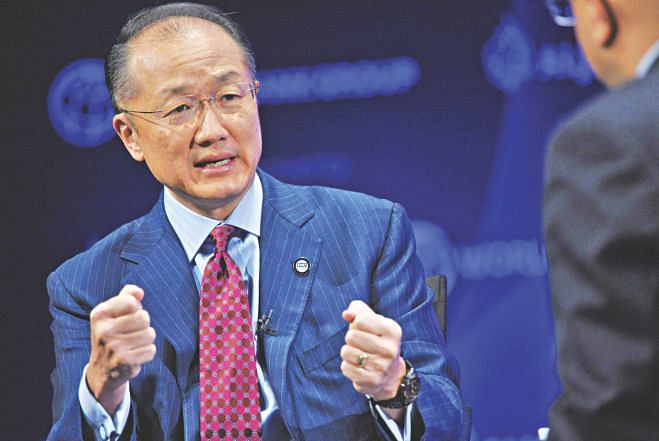Padma issue won't affect dev projects
Padma issue won't affect dev projects
WB president insists ties with Bangladesh govt continues to be good

The World Bank president has vowed to continue their support to the development of Bangladesh, saying the Padma bridge issue would not have any impact on other development projects.
“Our relationship with the government of Bangladesh has always been good, and will continue to be good,” WB President Jim Yong Kim told The Daily Star at a roundtable with reporters from developing countries at the WB headquarters in Washington DC on Wednesday.
On Padma bridge project, Kim said this was one project where the WB had trouble with and where it disagreed. “But that was just one project. We had many other projects going with the government at the same time.”
Also, he said, the WB was now finalising plans to sign agreements for $2.7 billion worth of new investments in Bangladesh. “So, Bangladesh is a very important partner for us.”
But the stance the bank takes on showing zero tolerance for corruption is one that it will always take, and it doesn't matter which government it is.
“And, just like in the Bangladesh case, because there has been a problem with corruption, doesn't mean that we break off the relationship,” he said.
The WB scrapped its $1.2 billion loan deal for the Padma bridge project in 2012 over alleged corruption conspiracies involving former communications minister Syed Abul Hossain in hiring a Canadian consultancy firm, SNC-Lavalin.
Following the WB decision, other donors -- Asian Development Bank, Islamic Development Bank and Jica -- also pulled out of the project.
But through the new lending, Kim said, the WB was hoping to engage very directly with the government and with all of the other players in Bangladesh in trying to take the country to even lower levels of poverty. “We will continue to work with Bangladesh very closely.”
Replying queries from The Daily Star, he said Bangladesh had had some very impressive results. “The poverty level has gone down dramatically since 1990 and even from 2000 to 2010. There has been significant reduction in levels of extreme poverty in Bangladesh.”
Referring to the six percent growth in each of the last five years, he, however, said Bangladesh had a lot of challenges, just like many other developing countries, and the country needed to improve power generation.
“I think that again, Bangladesh is another country that has to make use of this democratic dividend, invest in the education of its young people,” he said.
He also said: “We really have to face up to the enormity of the challenge of adaptation to climate change in Bangladesh that so much of the land area will be flooded if the seas continue to rise.”
Some of the illustrations available online show that even small changes in the sea level could have a devastating impact on Bangladesh, he said. "So adaptation will be the key. We're also very ready to work with Bangladesh on adaptation to climate change."
ANTI-POVERTY VOW
As the Spring Meetings of the World Bank and the IMF begin in Washington today, Kim vowed to make “huge contributions” towards global efforts to end extreme poverty in a generation.
“We live in a time of great contrasts, when fewer than 100 people control as much of the world's wealth as the poorest 3.5 billion combined. But we also live in a time when many developing countries have the strongest growth rates in the world, which each year helps millions of people lift themselves out of extreme poverty,” he said
Roughly 1 billion people around the world live in extreme poverty today in 2014 -- this is down from an estimated 1.2 billion people in 2010, according to an estimate by the World Bank.
“This difficult-to-grasp number is falling steadily and surely, but reaching our twin goals of ending extreme poverty by 2030 and boosting shared prosperity won't be easy,” he said.
Developing countries will have to grow at a pace stronger than any time in the past 20 years, Kim said.
To end extreme poverty by 2030, the vast rolls of the poorest -- those earning less than $1.25 a day -- will have to decrease by 50 million people each year.
To reach that goal, 1 million people will have to lift themselves out of poverty each week for the next 16 years.
"This will be extraordinarily difficult, but I believe we can do it. This can be the generation that ends extreme poverty."
“Economic growth has been vital for reducing extreme poverty and improving the lives of many poor people. But this mass migration of people moving from poverty to prosperity is really to gather strength, we need growth that is inclusive, creates jobs and assists the poor directly," he said.
At another media briefing in Washington yesterday, IMF Managing Director Christine Lagarde said she would expect global growth at 3.6 percent this year and 3.9 percent next year.
“The emerging markets and developing economies continue to be the main source of growth, even if a bit slower than in the past. The advanced economies are finally strengthening a bit.”
“Our overall message, the global economy is turning the corner, but the recovery is still too weak and too slow."
So, the bottom line is, it is fairly good, but not good enough and the world can do better, she said.
“For some, despite the fact that growth is strengthening, they are not feeling it. We still have 200 million people unemployed.”